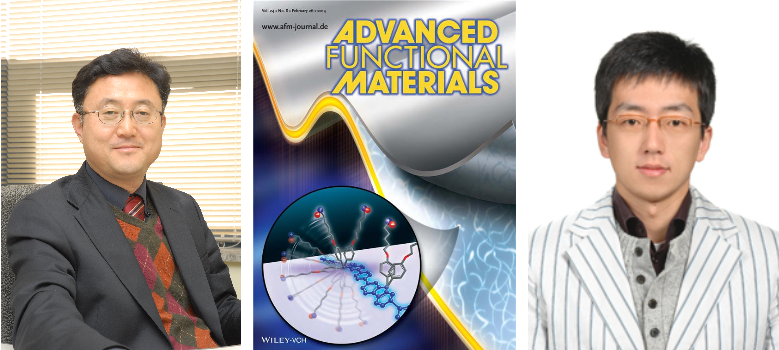Media Center
A multimedia mosaic of moments at GIST
GIST Excellence
Way to significantly enhance organic solar cell efficiency is discovered for the first time
- 김슬혜
- REG_DATE : 2014.03.24
- HIT : 928
Way to significantly enhance organic solar cell efficiency is discovered for the first time - Research team led by GIST Prof. Lee Kwanghee uncovers the possibility to control the performance of organic solar cells by adjusting ion concentration in conjugated polymer electrolytes - Sponsored by Ministry of Science, ICT&Future Planning and Gwangju…Published as front cover article by Advanced Functional Materials A group of Korean researchers successfully identified the working mechanism of conjugated polymer electrolytes used in ‘organic solar cells’ which draw attention as the next generation energy source for the first time in the world. Their research finding is expected to substantially increase the efficiency of organic solar cells and improve the function of organic electronic devices. ○The research was led by Professor Lee, Kwanghee (correspondent author) of the School of Materials Science and Engineering at GIST (Gwangju Institute of Science and Technology, President ž Young Joon Kim) and conducted by Dr. Lee, Byoung Hun (1st author) at GIST’s Research Institute for Solar and Sustainable Energies, under sponsorships by Senior Scientist Support Project (take-off research) and the Advanced Center of Excellence (NCRC) of the Ministry of Science, ICT and Future Planning and Gwangju Metropolitan City. The research result was published as the front cover article in the latest February 26th issue of Advanced Functional Materials which is one of the most prestigious international journals in the field of materials science. (Title: Multi-Charged Conjugated Polyelectrolytes as a Versatile Work Function Modifier for Organic Electronic Devices) □A ‘conjugated polymer electrolyte’ refers to a conjugated polymer (electrifiable plastic) combined with ions and has been hailed as a substance to facilitate the movement of electrons by attaching to the surface of electrodes in organic solar cells. ○Facilitated electrons movement helps to improve the function of an organic solar cell. Yet, the characteristics and roles of conjugated polymer electrolytes have not been clearly identified thus far that it was difficult to control the performance of organic solar cells. □The research team paid attention to the experiment result that device performance depends on the type of ions and so developed various types of conjugated polymer electrolytes with different ion concentration levels through a joint research with Prof. Woo Han-young (co-correspondent author) at Nanofusion Engineering Department of Busan University. ○When those conjugated polymer electrolytes with varying degrees of ion concentration were applied to organic solar cells and their performances were analyzed, the research team found the fact that ions in conjugated polymer electrolytes played a key role in determining the performance of devices and hence the performances of organic solar cells may be controlled by adjusting ion concentration. ○When ion concentration was raised in conjugated polymer electrolyte, the work function* of metal electrode showed a steady increase and the efficiency of organic solar cell also improved. In addition, they found the conjugated polymer electrolytes they have developed may also be applicable to various other types of organic electric device such as organic display and organic transistor. □The significance of this research is that the characteristics of conjugated polymer electrolytes used in organic solar cells were clearly identified, thereby suggesting new findings breaking away from the existing structure of devices. ○ Professor Lee Kwanghee said “This research helped us to understand the working mechanism of organic solar cells based on conjugated polymer electrolytes. The research finding will help to advance the commercialization of more efficient and reliable organic solar cells and electronic devices, thus contributing to the development of the strategic solar PV industry in Gwangju.” 
* Work Function: the amount of energy consumed to take out one electron from the surface of a solid object